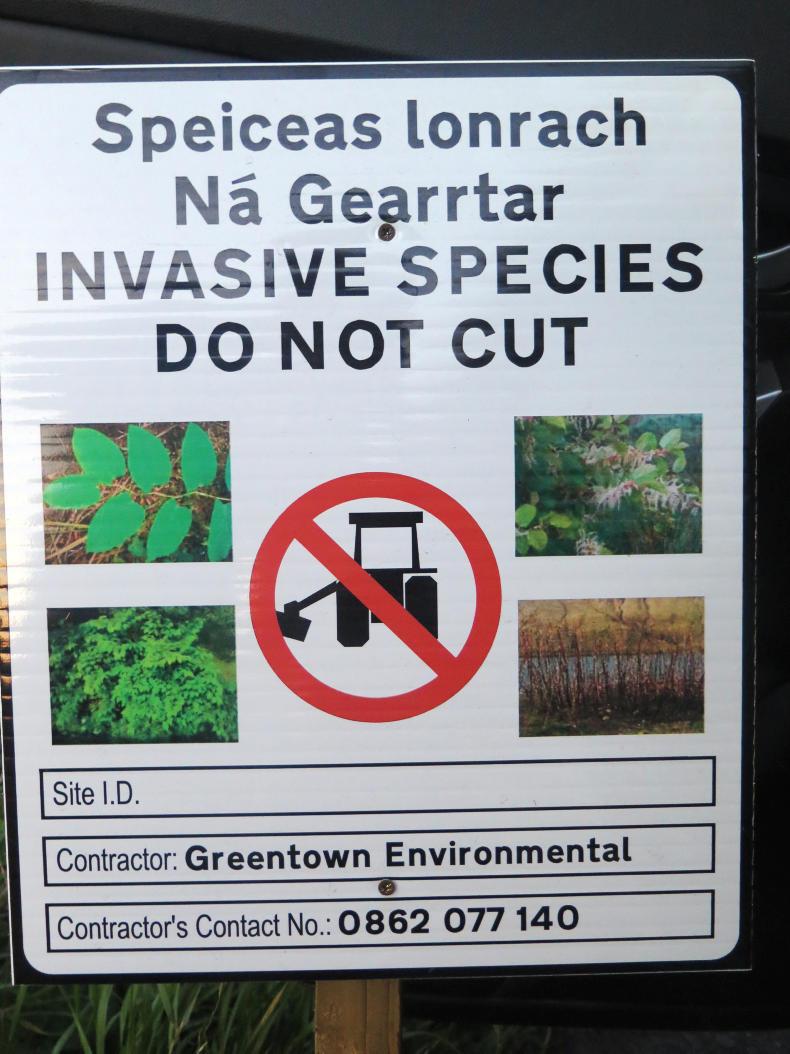Speaking with councils across Ireland, the Irish Farmers Journal understands that the plant is becoming hugely prevalent along roads and waterways.
The weed came to Ireland as an ornamental plant in early 19th century, however, since the 1980s it has spread rapidly across Ireland.
Japanese knotweed is a durable weed. When cut or pulled it aggressively multiplies. It can split concrete and damage infrastructure, such as homes and farm buildings, and can grow through tarmacadam, walls and fissures.

Under the Article 49 and 50 of the Birds and Habitats Regulation, it is an offence to plant or disperse the weed anywhere in the state.
Recently, signs have been seen around the country advising farmers not to cut the weed in fear of making the situation worse.
Liam Galvin, a councillor from Limerick and beef farmer expressed his concern to the Irish Farmers Journal .
“It is becoming a major issue nationwide. If you are a farmer or a member of the public checking out your front yard or garden, you need to be able to recognise this weed.
“It is detrimental to cut it, so make sure you contact your local authority,” Galvin said.

Care and vigilance is required when the plant is identified. Steps to combat the plant are as follows:
Never cut the weed.If you are walking in an area of Japanese knotweed, wash your footwear and clothes as you can spread it.If it is on your farm, fence around it.If you recognise it, take a picture and send it to your local authority or environmental agency, such as Envirico. If this is identified as Japanese knotweed, they will advise you on what to do.Do not treat it yourself. This weed should be treated by professionals at certain times of the year. Mismanagement can make the situation worse. Cost of the weed
The cost of treating this weed is varied, depending on the methods employed. Amateur attempts at treating the weed can result in resistance to herbicides and further expense in the future.
Expenses can be significant, however. Famously, Japanese knotweed on 70 hectares of the the London Olympics site cost £70 million to eradicate. It also delayed construction of a social housing estate in Clonakility, Co Cork, costing €8.7 million.
Read More
Invasion of Japanese knotweed reaching crisis point
‘Cautious optimisim’ for dairy but volatility to remain for beef farmers
Speaking with councils across Ireland, the Irish Farmers Journal understands that the plant is becoming hugely prevalent along roads and waterways.
The weed came to Ireland as an ornamental plant in early 19th century, however, since the 1980s it has spread rapidly across Ireland.
Japanese knotweed is a durable weed. When cut or pulled it aggressively multiplies. It can split concrete and damage infrastructure, such as homes and farm buildings, and can grow through tarmacadam, walls and fissures.

Under the Article 49 and 50 of the Birds and Habitats Regulation, it is an offence to plant or disperse the weed anywhere in the state.
Recently, signs have been seen around the country advising farmers not to cut the weed in fear of making the situation worse.
Liam Galvin, a councillor from Limerick and beef farmer expressed his concern to the Irish Farmers Journal .
“It is becoming a major issue nationwide. If you are a farmer or a member of the public checking out your front yard or garden, you need to be able to recognise this weed.
“It is detrimental to cut it, so make sure you contact your local authority,” Galvin said.

Care and vigilance is required when the plant is identified. Steps to combat the plant are as follows:
Never cut the weed.If you are walking in an area of Japanese knotweed, wash your footwear and clothes as you can spread it.If it is on your farm, fence around it.If you recognise it, take a picture and send it to your local authority or environmental agency, such as Envirico. If this is identified as Japanese knotweed, they will advise you on what to do.Do not treat it yourself. This weed should be treated by professionals at certain times of the year. Mismanagement can make the situation worse. Cost of the weed
The cost of treating this weed is varied, depending on the methods employed. Amateur attempts at treating the weed can result in resistance to herbicides and further expense in the future.
Expenses can be significant, however. Famously, Japanese knotweed on 70 hectares of the the London Olympics site cost £70 million to eradicate. It also delayed construction of a social housing estate in Clonakility, Co Cork, costing €8.7 million.
Read More
Invasion of Japanese knotweed reaching crisis point
‘Cautious optimisim’ for dairy but volatility to remain for beef farmers








 This is a subscriber-only article
This is a subscriber-only article










SHARING OPTIONS: